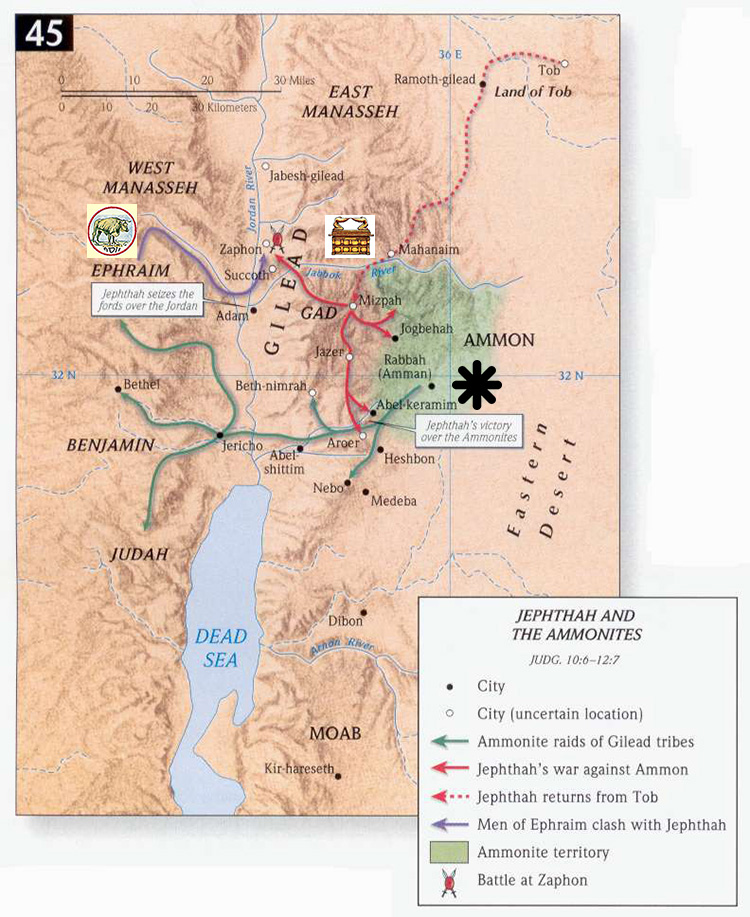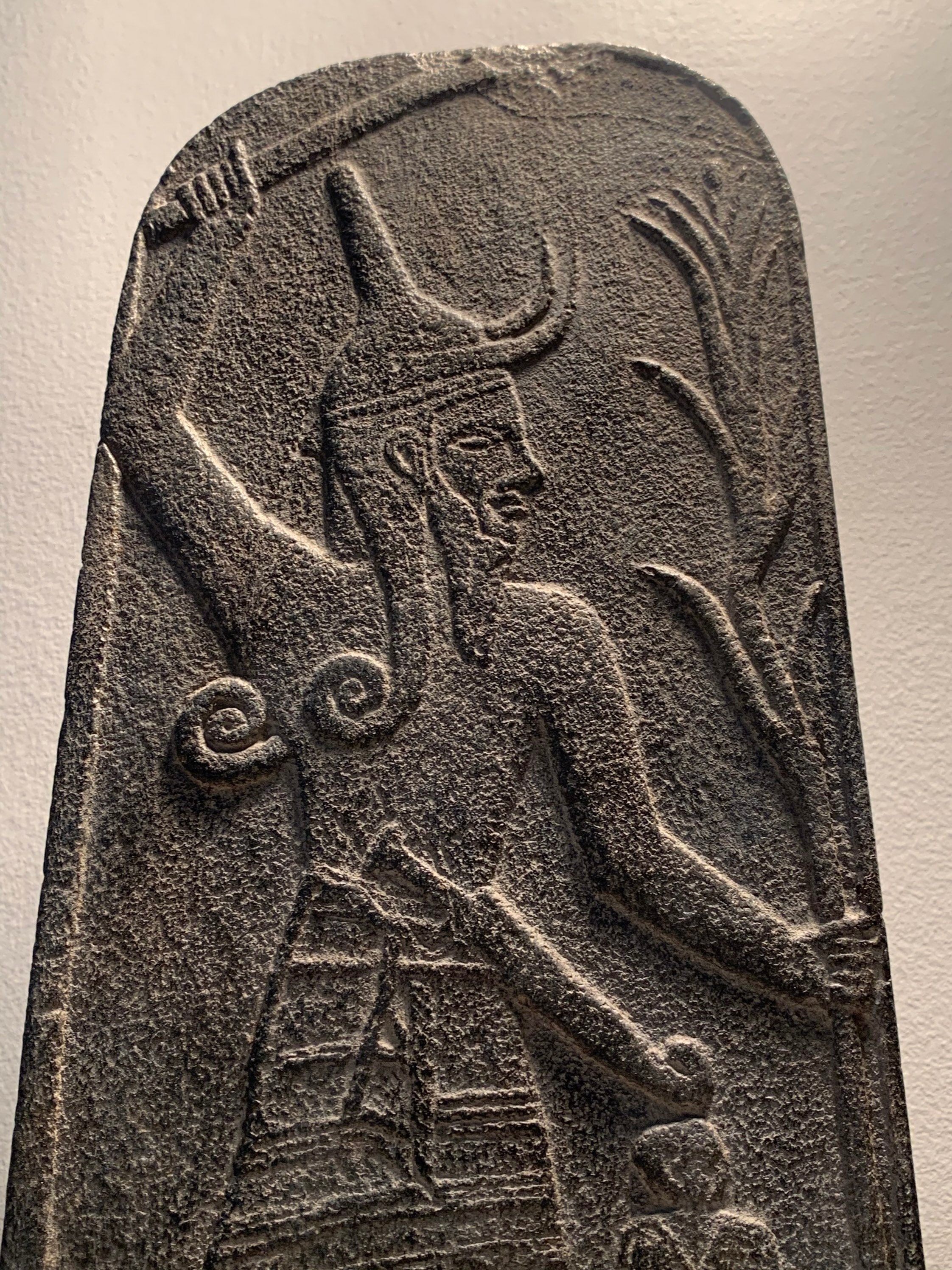The Israelites again did what was evil in the sight of the Lord, worshiping the Baals and the Astartes, the gods of Aram, the gods of Sidon, the gods of Moab, the gods of the Ammonites, and the gods of the Philistines. Thus they abandoned the Lord, and did not worship him. So the anger of the Lord was kindled against Israel, and he sold them into the hand of the Philistines and into the hand of the Ammonites, and they crushed and oppressed the Israelites that year. For eighteen years they oppressed all the Israelites that were beyond the Jordan in the land of the Amorites, which is in Gilead. The Ammonites also crossed the Jordan to fight against Judah and against Benjamin and against the house of Ephraim; so that Israel was greatly distressed.
So the Israelites cried to the Lord, saying, “We have sinned against you, because we have abandoned our God and have worshiped the Baals.” And the Lord said to the Israelites, “Did I not deliver you from the Egyptians and from the Amorites, from the Ammonites and from the Philistines? The Sidonians also, and the Amalekites, and the Maonites, oppressed you; and you cried to me, and I delivered you out of their hand. Yet you have abandoned me and worshiped other gods; therefore I will deliver you no more. Go and cry to the gods whom you have chosen; let them deliver you in the time of your distress.” And the Israelites said to the Lord, “We have sinned; do to us whatever seems good to you; but deliver us this day!” So they put away the foreign gods from among them and worshiped the Lord; and he could no longer bear to see Israel suffer. Then the Ammonites were called to arms, and they encamped in Gilead; and the Israelites came together, and they encamped at Mizpah. The commanders of the people of Gilead said to one another, “Who will begin the fight against the Ammonites? He shall be head over all the inhabitants of Gilead.”
Now Jephthah the Gileadite, the son of a prostitute, was a mighty warrior. Gilead was the father of Jephthah. Gilead’s wife also bore him sons; and when his wife’s sons grew up, they drove Jephthah away, saying to him, “You shall not inherit anything in our father’s house; for you are the son of another woman.” Then Jephthah fled from his brothers and lived in the land of Tob. Outlaws collected around Jephthah and went raiding with him.
After a time the Ammonites made war against Israel. And when the Ammonites made war against Israel, the elders of Gilead went to bring Jephthah from the land of Tob. They said to Jephthah, “Come and be our commander, so that we may fight with the Ammonites.” But Jephthah said to the elders of Gilead, “Are you not the very ones who rejected me and drove me out of my father’s house? So why do you come to me now when you are in trouble?” The elders of Gilead said to Jephthah, “Nevertheless, we have now turned back to you, so that you may go with us and fight with the Ammonites, and become head over us, over all the inhabitants of Gilead.” Jephthah said to the elders of Gilead, “If you bring me home again to fight with the Ammonites, and the Lord gives them over to me, I will be your head.” And the elders of Gilead said to Jephthah, “The Lord will be witness between us; we will surely do as you say.” So Jephthah went with the elders of Gilead, and the people made him head and commander over them; and Jephthah spoke all his words before the Lord at Mizpah.

Then Jephthah sent messengers to the king of the Ammonites and said, “What is there between you and me, that you have come to me to fight against my land?” The king of the Ammonites answered the messengers of Jephthah, “Because Israel, on coming from Egypt, took away my land from the Arnon to the Jabbok and to the Jordan; now therefore restore it peaceably.” Once again Jephthah sent messengers to the king of the Ammonites and said to him: “Thus says Jephthah: Israel did not take away the land of Moab or the land of the Ammonites, but when they came up from Egypt, Israel went through the wilderness to the Red Sea and came to Kadesh. Israel then sent messengers to the king of Edom, saying, ‘Let us pass through your land’; but the king of Edom would not listen. They also sent to the king of Moab, but he would not consent. So Israel remained at Kadesh. Then they journeyed through the wilderness, went around the land of Edom and the land of Moab, arrived on the east side of the land of Moab, and camped on the other side of the Arnon. They did not enter the territory of Moab, for the Arnon was the boundary of Moab. Israel then sent messengers to King Sihon of the Amorites, king of Heshbon; and Israel said to him, ‘Let us pass through your land to our country.’ But Sihon did not trust Israel to pass through his territory; so Sihon gathered all his people together, and encamped at Jahaz, and fought with Israel. Then the Lord, the God of Israel, gave Sihon and all his people into the hand of Israel, and they defeated them; so Israel occupied all the land of the Amorites, who inhabited that country. They occupied all the territory of the Amorites from the Arnon to the Jabbok and from the wilderness to the Jordan. So now the Lord, the God of Israel, has conquered the Amorites for the benefit of his people Israel. Do you intend to take their place? Should you not possess what your god Chemosh gives you to possess? And should we not be the ones to possess everything that the Lord our God has conquered for our benefit? Now are you any better than King Balak son of Zippor of Moab? Did he ever enter into conflict with Israel, or did he ever go to war with them? While Israel lived in Heshbon and its villages, and in Aroer and its villages, and in all the towns that are along the Arnon, three hundred years, why did you not recover them within that time? It is not I who have sinned against you, but you are the one who does me wrong by making war on me. Let the Lord, who is judge, decide today for the Israelites or for the Ammonites.” But the king of the Ammonites did not heed the message that Jephthah sent him.

Then the spirit of the Lord came upon Jephthah, and he passed through Gilead and Manasseh. He passed on to Mizpah of Gilead, and from Mizpah of Gilead he passed on to the Ammonites. And Jephthah made a vow to the Lord, and said, “If you will give the Ammonites into my hand, then whoever comes out of the doors of my house to meet me, when I return victorious from the Ammonites, shall be the Lord’s, to be offered up by me as a burnt offering.” So Jephthah crossed over to the Ammonites to fight against them; and the Lord gave them into his hand. He inflicted a massive defeat on them from Aroer to the neighborhood of Minnith, twenty towns, and as far as Abel-keramim. So the Ammonites were subdued before the people of Israel. Then Jephthah came to his home at Mizpah; and there was his daughter coming out to meet him with timbrels and with dancing. She was his only child; he had no son or daughter except her. When he saw her, he tore his clothes, and said, “Alas, my daughter! You have brought me very low; you have become the cause of great trouble to me. For I have opened my mouth to the Lord, and I cannot take back my vow.” She said to him, “My father, if you have opened your mouth to the Lord, do to me according to what has gone out of your mouth, now that the Lord has given you vengeance against your enemies, the Ammonites.” And she said to her father, “Let this thing be done for me: Grant me two months, so that I may go and wander on the mountains, and bewail my virginity, my companions and I.” “Go,” he said and sent her away for two months. So she departed, she and her companions, and bewailed her virginity on the mountains. At the end of two months, she returned to her father, who did with her according to the vow he had made. She had never slept with a man. So there arose an Israelite custom that for four days every year the daughters of Israel would go out to lament the daughter of Jephthah the Gileadite.

The men of Ephraim were called to arms, and they crossed to Zaphon and said to Jephthah, “Why did you cross over to fight against the Ammonites, and did not call us to go with you? We will burn your house down over you!” Jephthah said to them, “My people and I were engaged in conflict with the Ammonites who oppressed us severely. But when I called you, you did not deliver me from their hand. When I saw that you would not deliver me, I took my life in my hand, and crossed over against the Ammonites, and the Lord gave them into my hand. Why then have you come up to me this day, to fight against me?” Then Jephthah gathered all the men of Gilead and fought with Ephraim; and the men of Gilead defeated Ephraim, because they said, “You are fugitives from Ephraim, you Gileadites—in the heart of Ephraim and Manasseh.” Then the Gileadites took the fords of the Jordan against the Ephraimites. Whenever one of the fugitives of Ephraim said, “Let me go over,” the men of Gilead would say to him, “Are you an Ephraimite?” When he said, “No,” they said to him, “Then say Shibboleth,” and he said, “Sibboleth,” for he could not pronounce it right. Then they seized him and killed him at the fords of the Jordan. Forty-two thousand of the Ephraimites fell at that time. Jephthah judged Israel six years. Then Jephthah the Gileadite died, and was buried in his town in Gilead.
After him Ibzan of Bethlehem judged Israel. He had thirty sons. He gave his thirty daughters in marriage outside his clan and brought in thirty young women from outside for his sons. He judged Israel seven years. Then Ibzan died, and was buried at Bethlehem. After him Elon the Zebulunite judged Israel; and he judged Israel ten years. Then Elon the Zebulunite died, and was buried at Aijalon in the land of Zebulun. After him Abdon son of Hillel the Pirathonite judged Israel. He had forty sons and thirty grandsons, who rode on seventy donkeys; he judged Israel eight years. Then Abdon son of Hillel the Pirathonite died, and was buried at Pirathon in the land of Ephraim, in the hill country of the Amalekites.







No comments:
Post a Comment